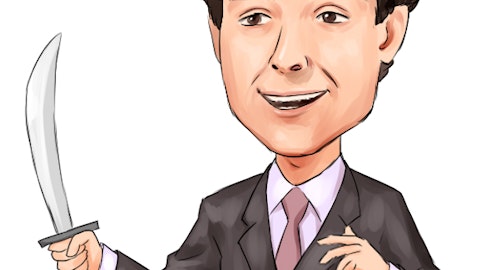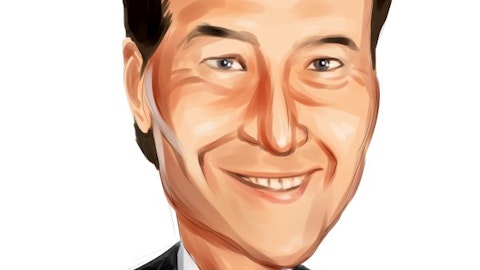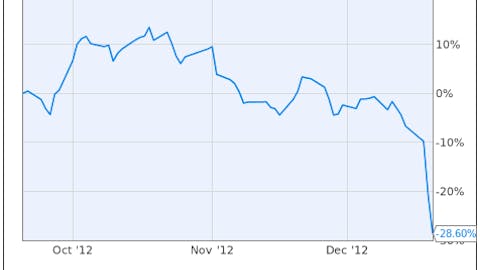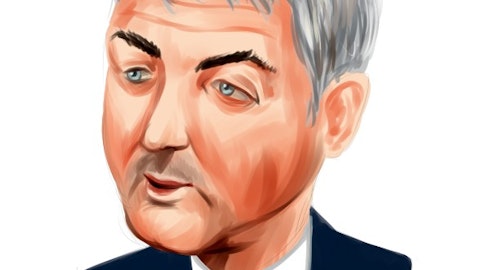Herbalife Ltd. (NYSE:HLF) has fallen by more than 35% over the past week on news that billionaire investor Bill Ackman of Pershing Square Capital had a short position in the stock. After the announcement, Ackman also released a detailed 340-page analysis outlining various problems at the nutritional products company, namely calling it a “pyramid scheme.” Here’s Bill Ackman’s entire stock portfolio.
Assuming they still own the same number of shares that they held at the end of 3Q, there were quite a few big-name investors that lost money following Herbalife’s plunge, including Patrick McCormick of Tiger Consumer Management and Jim Simons of Renaissance Technologies (check out all of Jim Simons’ top picks).
Billionaire David Einhorn of Greenlight Capital also verbally questioned the company back in May of 2012, citing a lack of clarity related to Herbalife’s business model as a reason to be wary. The hedge fund manager jumped on Herbalife’s May 2012 earnings conference call and asked questions concerning the logic behind distributor disclosure, and metrics used to track performance. Whitney Tilson of T2 Partners has recently joined in on the Herbalife attacks, announcing a short position in the stock.
So what are the details of Ackman’s presentation?
First and foremost, Herbalife’s primarily function is marketing, and Ackman’s main accusation is that its business model is a pyramid scheme, which occurs when “participants obtain their monetary benefits primarily from recruitment rather than the sale of goods and services to consumers.” The SEC considers pyramid schemes fraudulent because they will eventually collapse, due to the fact that the money made at the top is a product of the losses made at the bottom. To be considered a pyramid scheme by the FTC, less than 50% of retail profits must be paid out in the form of recruiting rewards.
Ackman’s detailed presentation on Herbalife Ltd. (NYSE:HLF) outlines the fact that Herbalife does indeed pay more than 50% of its retail profits to recruiting, mainly driven by the fact that its “suggested retail price is an artificially inflated number with no relation to the price at which Herbalife’s products are actually sold to retail customers.” Allegedly, these numbers are overstated to conceal the fact that recruiting rewards well outpace the retail profit earned by Herbalife distributors.
Continue reading on the next page…
According to Ackman, the problem with Herbalife’s financial statements is that retail sales “assume 100% of sales made by distributors are made at the inflated suggested retail prices”. Ackman’s findings show that actual retail sales for Herbalife’s products come in around 65% of the suggested retail price. Ackman then outlines adjustments to Herbalife’s income statement that he feels better convey the company’s true recruitment/reward spending.
These adjustments include the fact that that internal consumption should not be counted as retail profits, where the problem lies in the fact that Herbalife does not “track how much product is resold to retail customers…nor the sales outside the network.” Another big adjustment by Ackman is taking into account the wholesale commissions paid to distributors, which Herbalife tries to conceal to boost retail profits. The billionaire also believes that Herbalife has buried recruiting rewards in SG&A expenses.
Taking into account all of these adjustments, Ackman believes that the nutrition company paid out 92% of its 2011 retail profits in the form of rewards, compared to the stated 31% in its financial statements. By all accounts – under Ackman’s ad-hoc scenario – Herbalife would be considered a pyramid scheme given “participants obtain their monetary benefits primarily from recruitment rather than the sale of goods.”
Digging deeper into the pyramid scheme allegations, Ackman estimates that 93% of Herbalife distributors make $0, and only 0.04% make more than $100,000. Further piling on the allegations is Ackman’s estimation that the top 1% of Herbalife distributors receives 88% of all the rewards.
Ackman points out that Herbalife claims to have the highest research and development standards in the industry, but in looking at an excerpt from the company’s 2011 annual report, it shows that Herbalife’s “research and development costs were expensed as incurred and were not material.” Ackman has trouble understanding why Herbalife’s products are so successful, especially when the company “spends ‘de minimis’ dollars on advertising.” He believes the advertising money deployed actually goes toward promoting the company’s name and logo rather than its products.
So what can investors do?
Our hesitation to go all in on the Herbalife short is that Herbalife’s fundamentals appear strong. The stock pays a 4.4% dividend yield that is well covered with free cash flow and long-term expected growth is robust as exhibited by a 5-year expected earnings growth rate of 15%. We are also encouraged by the fact that more than 70% of sales come from outside the U.S., with growth drivers being Mexico, South & Central America and Asia Pacific.
A few of Herbalife’s big multi-level marketing peers include Avon Products, Inc. (NYSE:AVP), Nu Skin Enterprises, Inc. (NYSE:NUS), Weight Watchers International, Inc. (NYSE:WTW) and Medifast, Inc. (NYSE:MED). These MLM companies have held up surprisingly well following Ackman’s acquisitions. Ken Fisher took a new position in Avon last quarter (check out all of Ken Fisher’s newest picks).
A number of billionaires still love these multi-level marketing companies, and investors have refrained from selling off despite Herbalife-related concerns. Nu Skin is down the most of Herbalife’s competitors at 25% over the last month, and Avon is down the least at only 2%. Israel Englander and D.E. Shaw were two of the top-name investors in Nu Skin (see D.E. Shaw’s hottest picks here).
Weight Watchers, meanwhile is the largest provider of weight control programs in the world and next to Herbalife, it trades the cheapest on a forward P/E basis at 11x. Billionaire Ken Griffin – founder of Citadel Investment Group – is now one of Weight Watchers biggest shareholders after increasing his stake over 1000% last quarter (check out Ken Griffin’s biggest bets).
Medifast operates Jason Pharmaceuticals, which produces consumable health and diet products. These include weight management and sports nutrition pharmaceuticals. Medifast trades at the most expensive forward P/E (18x) of the five MLM companies listed here. Billionaire Steven Cohen of SAC Capital was a key investor in Medifast last quarter (check out Steven Cohen’s top picks).
In short, we remain cautious on Ackman’s statement that Herbalife could hit his $0 price target. If this doomsday scenario does occur, the fallout will be far reaching; the nutrition company has about 2.7 million distributors. It is tough to think Ackman will be able to bring down a 30-year old company with over $4 billion in revenue mostly on his own. Ackman’s allegations and ad-hoc analysis are not exactly a ‘smoking-gun’ given it will take a higher power to actually label the company a fraud. The SEC found no issues with Herbalife’s business model in its 2008 analysis of the company.
Here’s some additional coverage of this ongoing situation:
Did David Einhorn Short Herbalife Ltd. (HLF) With Bill Ackman?
Ackman Has Made At Least $250M From Herbalife Ltd. (HLF) Short, Will Give His Profits to Charity
Herbalife Ltd. (HLF) Hammered Again, Ackman’s Four Pillars of a ‘Pyramid Scheme’






